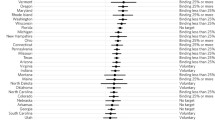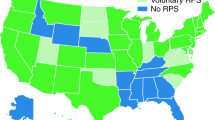Abstract
In this article, I provide a new political rationale for stringent renewable energy standards, such as portfolio requirements and feed-in tariffs. A game-theoretic analysis demonstrates that if a green politician (concerned about environmental quality) adopts a stringent renewable energy standard, thus creating artificial profits for the renewables industry, she can induce the industry to support her in elections. This political mobilization improves the green politician’s electoral fortunes, and thus increases the probability that the renewable energy standard will be implemented. In contrast to previous arguments for renewable energy standards, my argument applies even when the renewables industry is disorganized at the time of environmental policy formation.

Similar content being viewed by others
Notes
“New Energy Powers Up Lobbying.” Huffington Post April 22, 2010.
“What Green Jobs?” Newsweek July 28, 2009.
“Renewable and Alternative Energy Portfolio Standards.” Pew Center on Global Climate Change December 14, 2009. See http://www.pewclimate.org/what_s_being_done/in_the_states/rps.cfm. Accessed May 20, 2011.
“EU Climate Package Explained.” BBC April 9, 2010.
In the total absence of barriers to entry, this argument does not apply because relentless competition drives rents to zero.
References
Aidt TS, Dutta J (2004) Transitional politics: emerging incentive-based instruments in environmental regulation. J Environ Econ Manag 47:458–479
Arthur WB (1989) Competing technologies, increasing returns and lock-in by historical events. Econ J 99:106–131
Becker GS (1983) A theory of competition among pressure groups for political influence. Q J Econ 98:371–400
Buchanan JM, Tullock G (1975) Polluters’ profits and political response: direct controls versus taxes. Am Econ Rev 65:139–147
Campos JE (1989) Legislative institutions, lobbying, and the endogenous choice of regulatory instruments: a political economy approach to instrument choice. J Law Econ Organ 5:333–353
Cowan R (1990) Nuclear power reactors: a study in technological lock-in. J Econ Hist 50:541–567
del Río P, Unruh GC (2007) Overcoming the lock-out of renewable energy technologies in Spain: the cases of wind and solar electricity. Renew Sust Energy Rev 11:1498–1513
Fischer C, Newell RG (2008) Environmental and technology policies for climate mitigation. J Environ Econ Manag 55:142–162
Grossman GM, Helpman E (1994) Protection for sale. Am Econ Rev 84:833–850
Heinzel C, Winkler T (2011) Economic functioning and politically pragmatic justification of tradable green certificates in Poland. Environ Econ Policy Stud 13(2):157–175
Kawahara S (2011) Electoral competition with environmental policy as a second best transfer. Resour Energy Econ 33:477–495
Keohane NO, Revesz RL, Stavins RN (1998) The choice of regulatory instruments in environmental policy. Harv Environ Law Rev 22:313–367
Laird FN, Stefes C (2009) The diverging paths of German and United States policies for renewable energy: sources of difference. Energy Policy 37:2619–2629
Lipp J (2007) Lessons for effective renewable electricity policy from Denmark, Germany and the United Kingdom. Energy Policy 35:5481–5495
Lyon TP, Yin H (2010) Why do states adopt renewable portfolio standards?: an empirical investigation. Energy J 31:131–155
Mendonça M (2007) Feed-in tariffs: accelerating the deployment of renewable energy. Earthscan, London
Mitra D (1999) Endogenous lobby formation and endogenous protection: a long-run model of trade policy determination. Am Econ Rev 89:1116–1134
Oye KA, Maxwell JH (1994) Self-interest and environmental management. J Theor Politics 6:593–624
Palmer K, Burtraw D (2005) Cost-effectiveness of renewable energy policies. Energy Econ 27:873–894
Peltzman S (1976) Toward a more general theory of regulation. J Law Econ 19:211–240
Rabe B (2004) Statehouse and greenhouse: the evolving politics of American climate change policy. Brookings Institution Press, Washington
Rabe BG (2008) States on steroids: the intergovernmental odyssey of American climate policy. Rev Policy Res 25:105–128
Stigler GJ (1971) The theory of economic regulation. Bell J Econ 2:3–21
Unruh GC (2000) Understanding carbon lock-in. Energy Policy 28:817–830
Urpelainen J (2009) Explaining the Schwarzenegger phenomenon: local frontrunners in climate policy. Global Environ Politics 9:82–105
Wiser R, Namovicz C, Gielecki M, Smith R (2007) The experience with renewable portfolio standards in the United States. Electr J 20:8–20
Acknowledgments
I thank Michaël Aklin, Christopher Marcoux, the anonymous reviewers, and the editor of Environmental Economics and Policy Studies for comments and advice.
Author information
Authors and Affiliations
Corresponding author
About this article
Cite this article
Urpelainen, J. How do electoral competition and special interests shape the stringency of renewable energy standards?. Environ Econ Policy Stud 14, 23–34 (2012). https://doi.org/10.1007/s10018-011-0020-4
Received:
Accepted:
Published:
Issue Date:
DOI: https://doi.org/10.1007/s10018-011-0020-4




